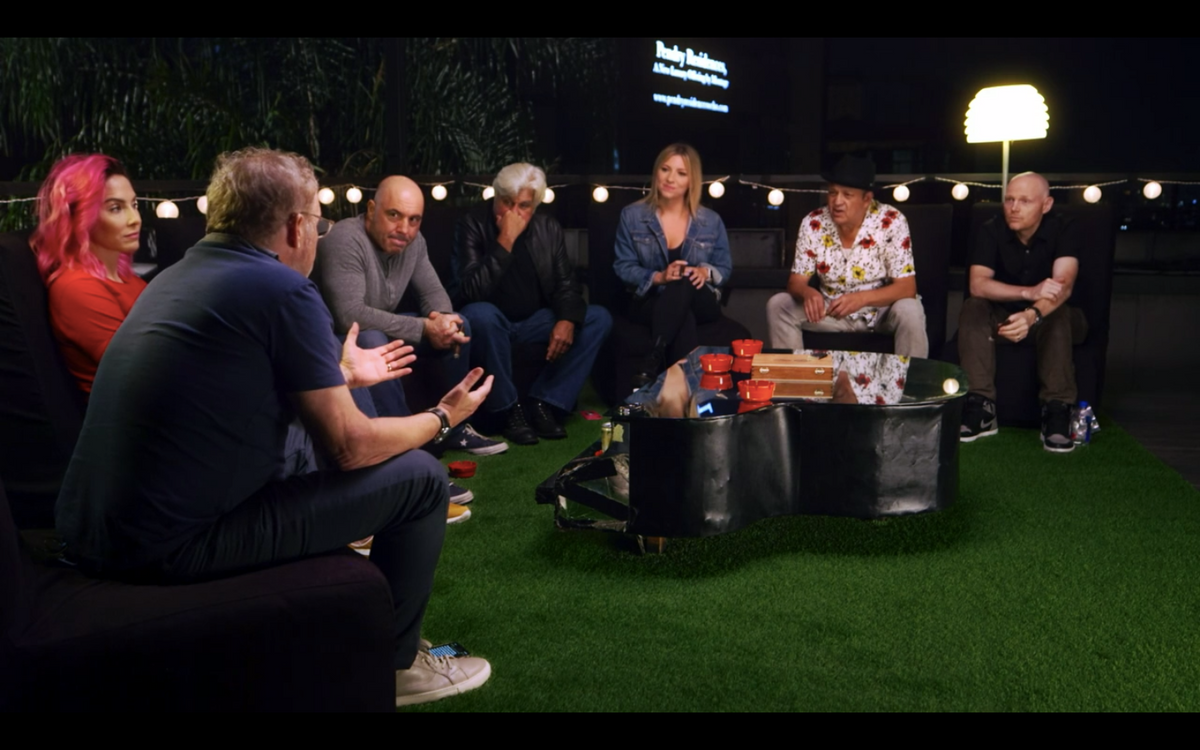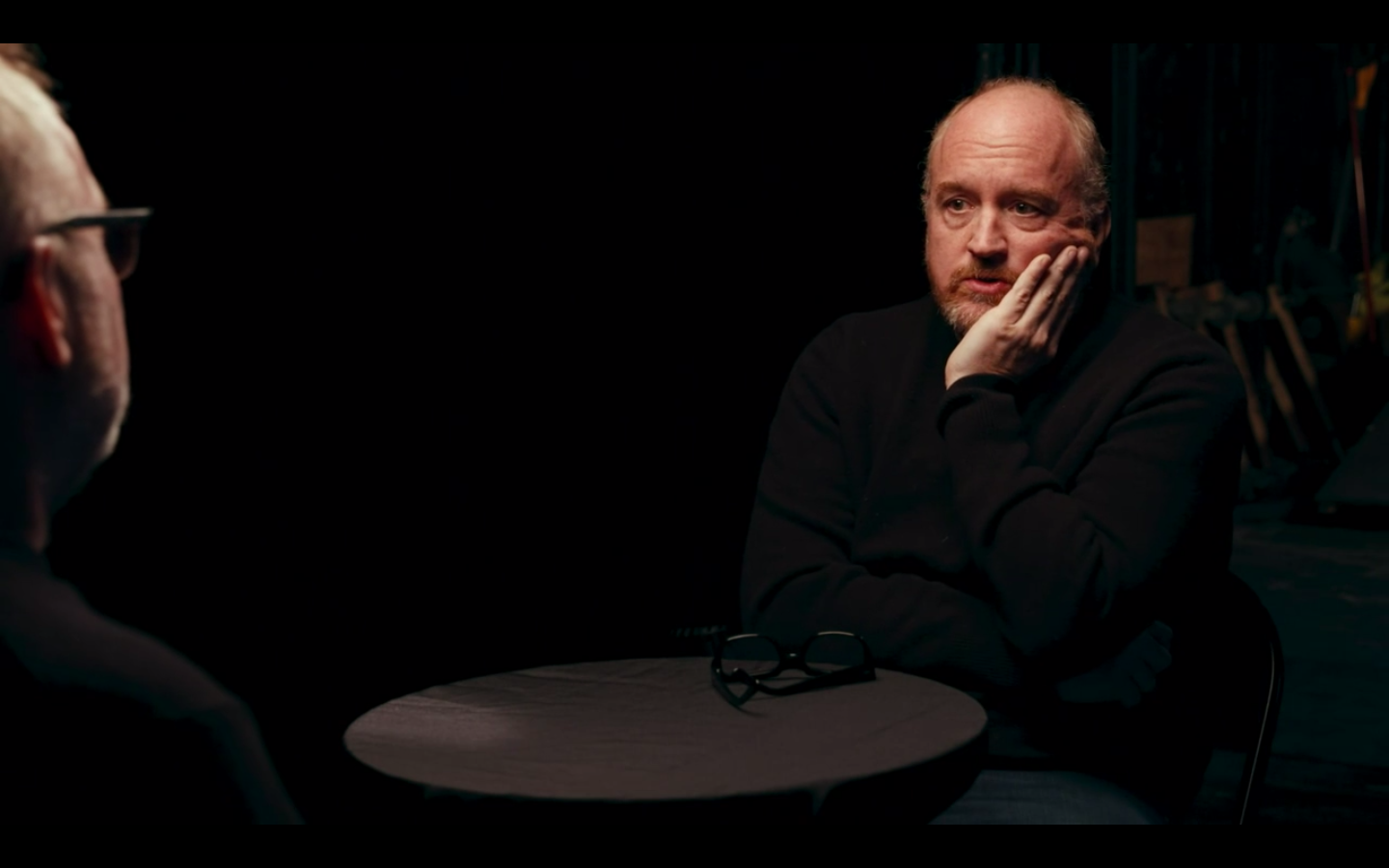"It’s not fun for people to hate you."
On Showtime's new documentary about the Comedy Store.

Hey. Did anything interesting happen today? Well, here’s a newsletter that has nothing to do with it. Thanks as always for reading.
In the final episode of The Comedy Store, an intriguing new Showtime documentary series, writer-director Mike Binder gathers a group of comics on the roof of the titular club and asks whether they feel stifled by all the “restrictions” on what comedians can joke about these days. “It’s not fun. It’s not fun for people to hate you. It’s not fun for people to take what you say out of context,” answers Joe Rogan, whose new deal with Spotify is reportedly worth more than $100 million. “You’re putting it in quotes… It’s a dishonest way to approach it. But the more we talk about how dishonest it is, the more that gets out in the zeitgeist and the more that has less power.”
Paul Rodriguez, an actor, comedian, co-owner of the Laugh Factory, and Trump supporter who in 2010 falsely said he had been appointed to the California Water Board, agrees: “The power that PC has to really obliterate the careers of some great comics… It’s come down to the point where you’re trying to do material that offends the least amount of people.” So does Jay Leno, the former talk show host who currently has a YouTube series about his multimillion-dollar car collection. “Anybody can pull the cord and stop the train,” he says. “I mean. Louis CK did some shows in New York and they sold out. And one person complained, and suddenly that becomes, that’s the headline… There was nobody worse than Picasso, but people are not tearing up his paintings. He did horrible things to women.” Bill Burr, who recently hosted Saturday Night Live and works with Louis CK’s former manager, adds: “If you don’t like what he did, don’t go to the show.”
From the outset, the discussion makes no distinction between (purported) restrictions on disagreeable speech and those on abusive behavior. Whitney Cummings argues that comedy clubs are supposed to be a haven for people with fucked up pasts, where they can turn their lies and betrayals into catharsis. “There’s this expectation that everybody is supposed to have lived a perfect life, their record is supposed to be perfect,” offers Annie Lederman. Binder cuts between the rooftop discussion and separate interviews with other Comedy Store regulars, like David Spade, whose romcom The Wrong Missy is reportedly one of Netflix’s most-watched movies. “I still hope and pray that you can say whatever you want and not go down for it,” he tells Binder. “If you say it on a talk show, fine. If you say it in real life and you get caught, fine. But when you’re doing comedy onstage, that’s the place, try whatever you want, break the rules, piss people off, do what everyone used to always do. And now even I’m scared there’s bits I think that would work and I go, I don’t want to lose my career.”

“How long do you punish somebody?” asks Binder, acknowledging later that “people” didn’t want him to interview Louis CK for the series. With Cummings’ approval, he did, conveniently omitting from the final product any mention of the reason for CK’s fall from grace. “You’ve gone through such a tough period in your life,” he tells the confessed sexual abuser during their sit-down. “I don’t mean to be Pollyanna about it, but I think it’s just going to make you such a better comic.” In response, CK recalls the owner of a chess shop telling him he’s a great martyr who must be crucified and destroyed before coming back to life. “I’d really rather fucking live my life,” he says. “But my philosophy with comedy has always been, when somebody says ‘That’s too terrible to joke about,’ that’s like saying that that disease is too terrible to cure.”
The Comedy Store is an interesting documentary—funny, flawed, often illuminating, occasionally disturbing. If you enjoy watching your favorite comics share gossip and palace intrigue (as I do), there’s plenty to scratch your itch. And if you find it useful to watch victors write history, well, that’s pretty much all it is. Executive producers Pauly and Peter Shore are the Store’s owners and sons of its beloved founder, Mitzi Shore. Writer-director Mike Binder was one of the first to cross the picket line during the 1979 strike, when comics fought to get paid for their labor. (Until that point they performed for free; Shore argued exposure was worth more than money, and that the club was like a family.) So were Argus Hamilton and Howie Mandel, two comics prominently featured throughout the documentary. There’s a frankly shocking sequence in the third episode when a number of interviewees describe Shore’s habit of sleeping with Store comics—often in exchange for stage time—as if it were a totally normal phenomenon. Binder recalls how she used to tell him not to mess around with the waitresses. “Why not?” he’d respond. “You mess around with the comics.”
It’s funny to see the metaphor lain so bare. The club is a club! Inside are a bunch of insiders literally smoking cigars as they bond over the perks of membership—the freedom to say whatever they want, fuck whomever they want—and bemoan the mob of jealous outsiders trying to tear away what they’ve rightfully earned. (Rogan, referring to no particular incident: “By shitting on someone’s comedy, and saying they shouldn’t be able to say it, you shouldn’t be laughing at it, all they’re doing is trying to validate their own failure as a comic.”) As they speak, the machinery amplifying their complaints works double-time to erase the crimes of their peer, presenting his social tarring as hysteria. In the eyes of The Comedy Store, sexual abuse is normal and unremarkable; the internet dunking on a famous guy’s standup set, however, is a grave moral panic.
I have a sinking suspicion we’ll hear a great deal about cancel culture in the coming weeks, as the center and right both try to blame the left for America’s political divides. (Sarah Silverman, TJ Miller, and Bill Simmons have already done this.) The Comedy Store usefully reframes this discourse, allowing us to see what it really is: a small group of people accustomed to the impunity their club provides, threatened by a new reality where what happens inside the club no longer stays there.
If only they could see it doesn’t matter. They’ll be fine. The club will protect them no matter what.
Images via Showtime.


